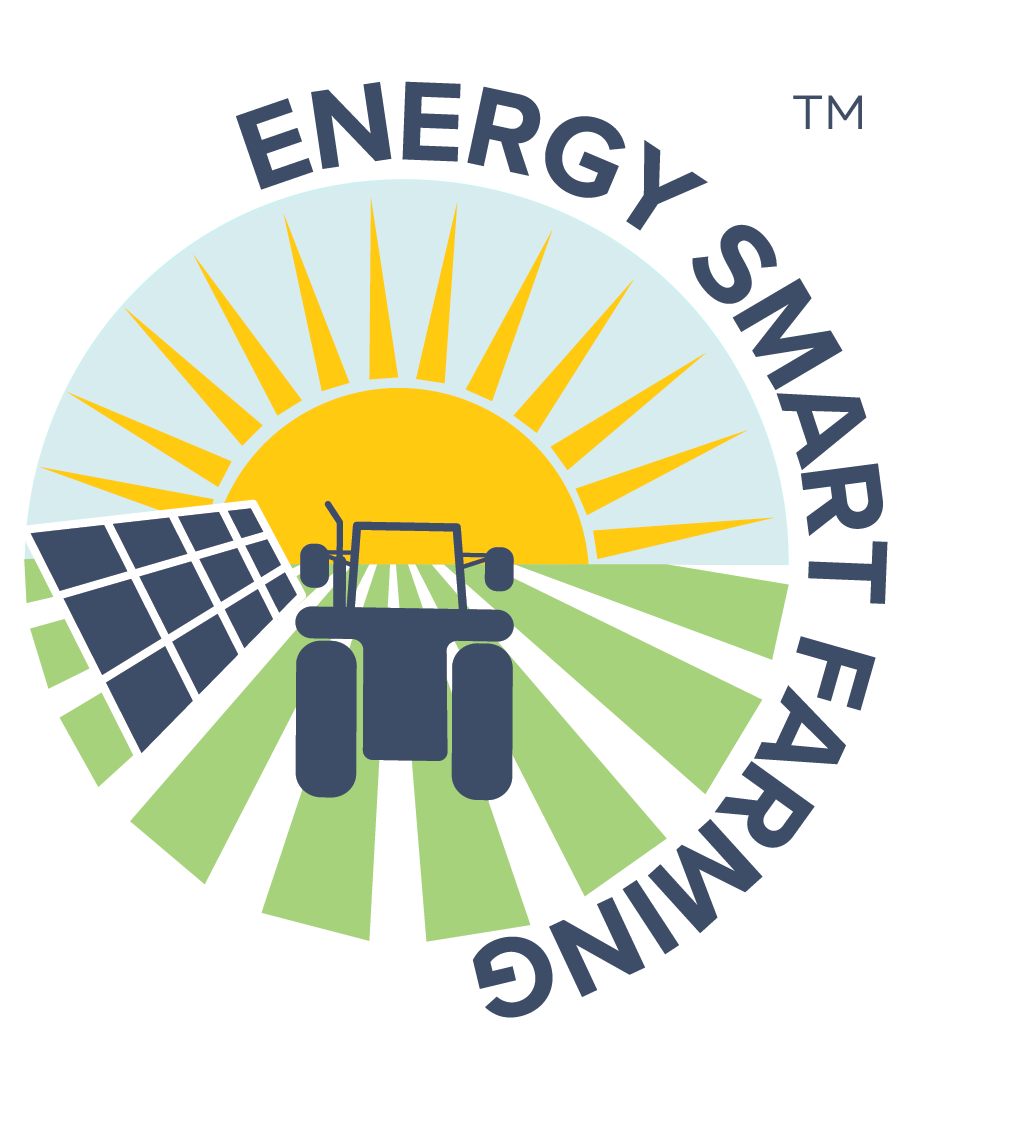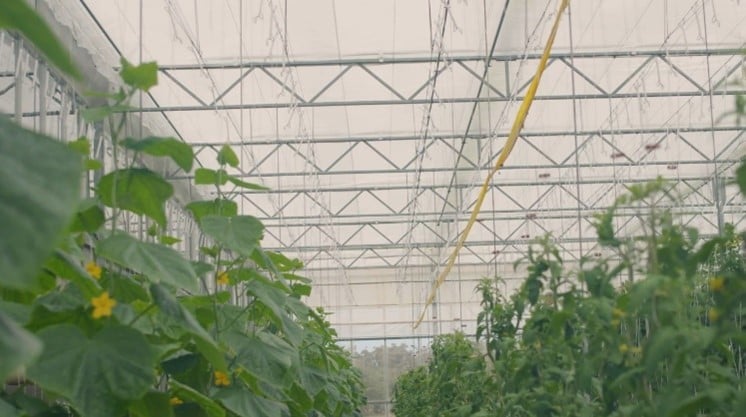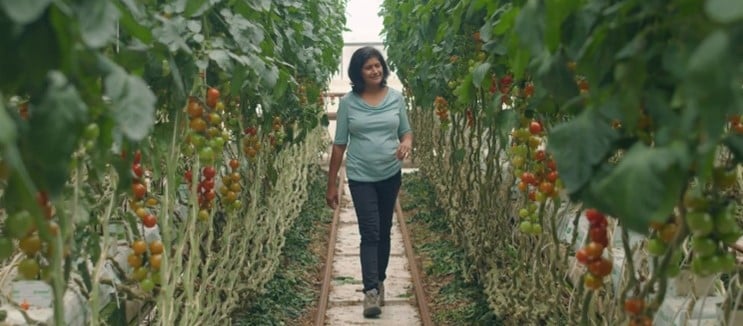Transcript – Victorian Energy Upgrades – Lonsdale Tomatoes
Participating in the Victorian Energy Upgrades (VEU) Program means Lonsdale Tomatoes is estimated to recoup in the order of 25-50% of the cost of installing thermal screens in their greenhouses through the sale of Victorian Energy Efficiency Certificates (VEECs), depending on the market price at time of sale.
Lonsdale Tomatoes installed thermal screens in their greenhouses, reducing heating requirements by one third and estimated to save around 1,690 GJ of gas annually. Sale of VEECs is also estimated to recoup 25-50% of the project costs.
Company: Lonsdale Tomatoes
Location: Portarlington, VIC
Industry: Agriculture, Hydroponic Vegetables
Description: Install greenhouse thermal screens and automated climate control system
Project costs: $150,000 – $200,000 (approx.)
Completed: 2022
BUSINESS SUMMARY
Lonsdale Tomatoes is a controlled environment producer of horticultural crops such as tomatoes, cucumbers, lettuce and herbs. Maintaining the environment for the crops requires heating the 5,120sqm of greenhouses, so improvements to the thermal efficiency of the structures reduces running costs and saves energy.
PROJECT SUMMARY
Lonsdale Tomatoes installed thermal screens in their greenhouses, reducing heat loss, along with a high-tech control system to automatically control all parameters of the system, which minimises the need for climate control.
Key outcomes from greenhouse upgrades
- 1,690 GJ of gas saved per year, representing a 32% reduction in annual gas consumption.
- 97 tCO2-e[1] saved
- Close to $20,000 saved in reduced annual gas costs.
- Recouped costs in the order of $50,000 from the one-off sale of around 1,000 VEECs[2]
Other project benefits
The combination of more stable temperatures in the greenhouses and the advanced controls system reduces the risk of adverse environment conditions, better ensuring production quality. The improved growing conditions mean that Lonsdale Tomatoes is expecting production gains of up to ten per cent, which will result in significant additional annual revenue.
HOW THE PROCESS WORKS
Opportunity identification and implementation
Lonsdale Tomatoes became aware of the VEU program through Agriculture Victoria. Participating in the program helps to reduce the payback period for energy efficiency upgrades.
“The Victorian Government made us aware of the VEU program…. We can recoup one quarter of the investment, to maybe even half the investment” – Sandhya, CEO Lonsdale Tomatoes
Measurement and verification (M7V)
The Accredited Person (AP)
To participate in the VEU program, an AP is engaged by the farmer, typically for no upfront cost[3]. The AP guides the farmer through the process, based on data provided by the farmer and calculating the energy savings required to produce VEECs.
M&V plan
To enable the eventual production of VEECs, a measurement and verification (M&V) process is used to calculate the energy savings associated with the project’s implementation.
First, the farm’s typical energy consumption patterns under business-as-usual operation must be determined, which is called the baseline energy consumption of the farm. The AP requests various data records of variables that impact on-farm energy consumption.
Lonsdale Tomatoes provided 12 months’ of data for gas consumption and production on the farm. From this data a satisfactory baseline was developed such that the M&V method could be utilised, and the AP applied for pre-approval to participate in the VEU program by submitting a scoping plan.
“We are already tracking our production data anyway, so it doesn’t require too much time and effort to just pass that data on for comparison with our past consumption history and patterns.” -Sandhya, CEO Lonsdale Tomatoes
Key considerations
Being able to provide good quality, validated data will maximise the number of VEECs you can generate using the M&V method under the VEU program. Working with the AP may require anywhere from 5-15 hours of your time as the AP carefully guides you through the VEU’s paperwork and submission requirements, however, the time invested can produce significant financial returns.
“Ultimately, the VEU program will assist Victorian farmers to reduce their energy costs and help them fund technology upgrades on their properties.” – Agriculture Victoria
For some projects it might be necessary to install sub-metering to measure energy consumption before and after project implementation, however for this project site-level data was appropriate.
It is critical that the AP develops the farm’s baseline energy consumption and has their M&V Plan approved by the Essential Services Commission (ESC[4]) before picking up any tools or purchasing any equipment. If the project commences before approval to participate in the VEU program, the project is automatically ineligible.
CHALLENGES AND LESSONS LEARNT
Involving the AP in the process as early as possible ensures they can explain the process for participating in the VEU program and let you know what is needed along the way. One of the challenges in agriculture is understanding seasonal production cycles and farming activities sufficiently well to estimate efficiency gains over a baseline.
For the Lonsdale Tomatoes project, one of the key issues was capturing sufficient gas consumption data. The readings undertaken by the retailer can sometimes be irregular, and therefore some manual gas meter readings were required prior to and after the implementation of the project. Through regular communication with the AP, a suitable energy model and gas consumption baseline was determined, allowing the project to generate VEECs.
[1] tonnes of carbon dioxide equivalent.
[2] VEECs are sold by an Accredited Person on behalf of the farmer to recoup some of the costs of the project.
[3] Similar to other brokerage services, APs often do not require up-front payment, and instead take a pre-determined portion of the VEEC sale price. However, APs can also offer different commercial arrangements.
[4] The ESC decides whether or not a project is eligible to participate in the VEU program, and APs deal directly with the ESC on behalf of the farmer.
MORE INFORMATION
How does the VEU program work? https://extensionaus.com.au/energysmartfarming/veu-process/
List of APs: https://www.veu-registry.vic.gov.au/Public/Participants2.aspx
Agriculture Victoria website: https://agriculture.vic.gov.au/farm-management/energy-on-farm
VEU Website: https://www.esc.vic.gov.au/victorian-energy-upgrades-program




